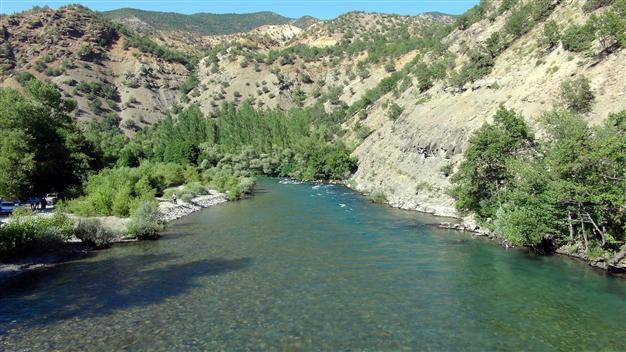Landmark victory for ecologists as court aborts fourth energy project in eastern Turkish valley
TUNCELİ

The Munzur Valley and national park is not only one of the most important natural spots in eastern Turkey, but it is also a region considered as sacred by Alevis, who constitute the majority of the population in Tunceli (Dersim). DHA Photo
An administrative court has canceled a project to build three hydroelectric plant and a dam project in one of the most important natural habitats in eastern Turkey in a ruling that could set a landmark precedent for future environmental activism.
Locals of Tunceli (Dersim) have long protested that the dams and reservoirs planned in the Munzur Valley and national park would not only damage nature, but also submerge areas considered sacred by Alevis, who constitute the majority of the population in the province.
According to the law, no construction is permitted in national parks, but activists believe that a new amendment has created a loophole enabling the construction of energy facilities if they are considered in line with the “general interest.” The amendment, which prompted a heated debate, was recently suspended by the Council of State.
The third administrative court in Ankara ruled on Oct. 31 to cancel the Kaletepe hydroelectric plant (HES) on the grounds that the justifications put forward to exempt the project from the mandatory environmental impact assessment report (ÇED) were unlawful.
Lawyers representing locals said the same court had scrapped three other power plant projects in the Munzur valley last July. Two of the projects – Konaktepe HES 1 and Konaktepe HES 2 – had been planned inside the boundaries of the Munzur National Park.
A total of four dams and five hydroelectric plants are planned for the region, but lawyers say the latest ruling is a decisive turn to prevent their construction.
“From now on nobody can even drive one nail into Munzur National Park. The construction of any dam and hydroelectric project is no longer possible. If the state tries to carry out a dam project in the valley, this will be entirely illegal, and no one will allow it,” said Özgür Ulaş Kaplan, one of the lawyers representing local activists.
“Thanks to this ruling, many of our touristic spot and our sacred areas have been saved. The decision is very important for the Alevi faith as well,” Kaplan added.
The reservoir of the Uzunçayır dam, completed in 2010, had been threatening one of the important peregrination places of Alevis, the Jara Gola Çetu Park, located at the intersection of the Munzur and Pülümür rivers. Locals had been demonstrating to prevent the valley, which has great significance for the Alevi faith, from becoming a patchwork of energy facilities and dams.
The ruling could also set a precedent for dozens of hydroelectric plants planned within national parks or first-degree natural sites across the country and particularly along the Black Sea coast or the Taurus Mountains. The micro-plants that produce limited amount of energy at the cost of the destruction of natural habitats in often untouched natural environments have long drawn huge criticism by ecologists. Many projects are the subject of litigation, but companies that win bids to build the plants frequently start construction work before waiting for the conclusion of legal processes.
